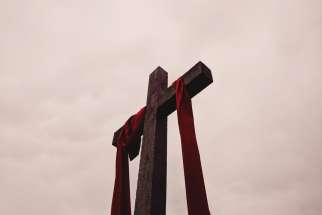Fifth Sunday of Easter (Year A) May 7 (Acts 6:1-7; Psalm 33; 1 Peter 2:4-9; John 14:1-12)
Tension and misunderstanding in church communities is nothing new. As the faith continued to spread, more people from disparate backgrounds joined the community, which often gives rise to friction and resentment.
Fourth Sunday of Easter (Year A) April 30 (Acts 2:14a, 36b-41; Psalm 23; 1 Peter 2:20b-25; John 10:1-10)
Many terrible things are done by ordinary, otherwise decent, people. It is easy to demonize a few villains and lay the blame on them, but what about when many have a hand — directly or indirectly — in the crime? Most of the time this is due to ignorance. People are not really aware of the true state of affairs or the consequences of their actions. Reality is refracted through a lens of fear, prejudices and commonly held opinions — usually wrong. Many are easily manipulated by purveyors of misinformation (lies) and demagogues.
Third Sunday of Easter (Year A) April 23 (Acts 2:14, 22b-28; Psalm 16; 1 Peter 1:17-21; Luke 24:13-35)
A rapid survey of the world reveals a very distressing panorama of violence, cruelty and injustice. The question that many shout heavenward is, “Where is God in all this?” But God is many steps ahead of humanity and is far more powerful than the worst that they can do.
Second Sunday of Easter (Year A) April 16 (Acts 2:42-47; Psalm 118; 1 Peter 1:3-9; John 20:19-31)
Unity is a source of great power and strength both for good and for ill. Totalitarian regimes of all types force their people to be as lockstep as possible. There is no room for individuality or independent thinking. We rightly fear this sort of unity, although there has been a disturbing drift in its direction in recent years.
Resurrection of the Lord (Year A) April 9 (Acts 10:34a, 37-43; Psalm 118; Colossians 3:3-4; John 20:1-18)
There were no elaborate theologies in the preaching of the apostles. They kept their proclamation focused on the main points: who Jesus was, what He did and what He was going to do. Jesus had been baptized by John, then anointed and empowered by the Holy Spirit. His whole ministry was given to helping and healing people. God had vindicated Him and ratified His deeds and words by raising Him from the dead. He appeared to His followers and talked with them.
Easter begins something beyond human capacity
On the Second Sunday of Lent, the Gospel was the story of Christ’s transfiguration on a mountaintop. Only three men of faith — Peter, James and John — accompanied Jesus as He was transfigured between Moses and Elijah. The three disciples were ordered to tell no one of the event until after Christ’s resurrection.
Passion (Palm) Sunday (Year A) April 2 (Isaiah 50:4-7; Psalm 22; Philippians 2:6-11; Matthew 26:14-27:66)
The job description for a prophet of the Lord is fairly simply but very exacting. He is no longer his own man; he belongs to God. This means that his own opinions, prejudices, plans and desires must be set aside. Rather than having a bully pulpit to hold forth on his favourite issues, he is strictly a spokesman for God and expresses the views of the one who anointed him.
God's Word on Sunday: Christ opens believers to God’s world
Fifth Sunday of Lent (Year A) March 26 (Ezekiel 37:12-14; Psalm 130; Romans 8:8-11; John 11:1-45)
For many people, dying far from home in a strange land, especially as a captive, is too grim and sad to even contemplate.
Fourth Sunday of Lent (Year A) March 19 (1 Samuel 16:1b, 6-7, 10-13; Psalm 23; Ephesians 5:8-14; John 9:1-41)
There are two ways of viewing the world in which we live and of experiencing life. The first is typically human and consists of looking and judging by outward appearances. Things that please the eye are accepted and praised, while unpleasing things are rejected and reviled. That is the way many people pass judgment on the world and on other people. Our culture, with its obsession with beauty, youth, bodily perfection and flashiness, thrives on this tendency.
The path to Easter is Christ’s Way
In this final stretch before Easter, let’s return to where we began — looking at the entirety of Christ’s way of being, as an integral whole of truth, goodness and beauty. Any other way risks removing something essential.
Third Sunday of Lent (Year A)March 12 (Exodus 17:3-7; Psalm 95; Romans 5:1-2, 5-8; John 4:5-42)
Is the Lord among us or not? This petulant expression of anger and doubt was the first sign of the rebellion and unbelief that would plague the Israelites during the entire journey to the Promised Land. At times it would threaten to rupture their relationship with God entirely.
Second Sunday of Lent. (Year A) March 5 (Genesis 12:1-4; Psalm 33; 2 Timothy 1:8b-10; Matthew 17:1-9)
Since the beginning of time, many people have been forced to flee and abandon their homes and land for a new life elsewhere. Sometimes the hope is very basic: survival. Marauding armies, plagues, social chaos and famine can make survival difficult or impossible. At other times, hopes for a better life for children and descendants can impel people outward. Our own times have witnessed the mass migrations of peoples and the arrival of many immigrants and refugees from all over the globe.
God's Word on Sunday: Christ’s power breaks the bondage of sin
First Sunday of Lent (Year A) Feb. 26 (Genesis 2:7-9, 16-18, 24, 3:1-7; Psalm 51; Romans 5:12-19; Matthew 4:1-11)
Lack of trust in God is at the root of most human evil. In the ancient teaching story of the Garden of Eden, the man and the woman were placed in the midst of an abundant garden with all of their needs met. But the tree of the knowledge of good and evil was strictly off-limits. The day they ate from that tree was the day that they would die.
God's Word on Sunday: Only God’s way will lead us from darkness
Seventh Sunday in Ordinary Time (Year A) Feb. 19 (Leviticus 19:1-2, 17-18; Psalm 103; 1 Corinthians 3:16-23; Matthew 5:38-48)
What does it mean to be holy? For starters, it has little or nothing to do with conventional piety. The tradition in the Old Testament offers a different perspective: holy is as holy does.
God's Word on Sunday: Did I add to light or darkness today?
Sixth Sunday in Ordinary Time, Feb. 12 (Year A) Sirach 15:15-20; Psalm 119; 1 Corinthians 2:6-10; Matthew 5:17-37
Evading responsibility for human actions is as old as humanity itself. It began in the Garden of Eden, with Adam and Eve pointing fingers at each other, and has continued down to our own time. We like to think of ourselves as helpless victims of forces greater than us and therefore not to blame for our negative actions. It used to be sufficient to blame the devil for everything but now we are more sophisticated.
















